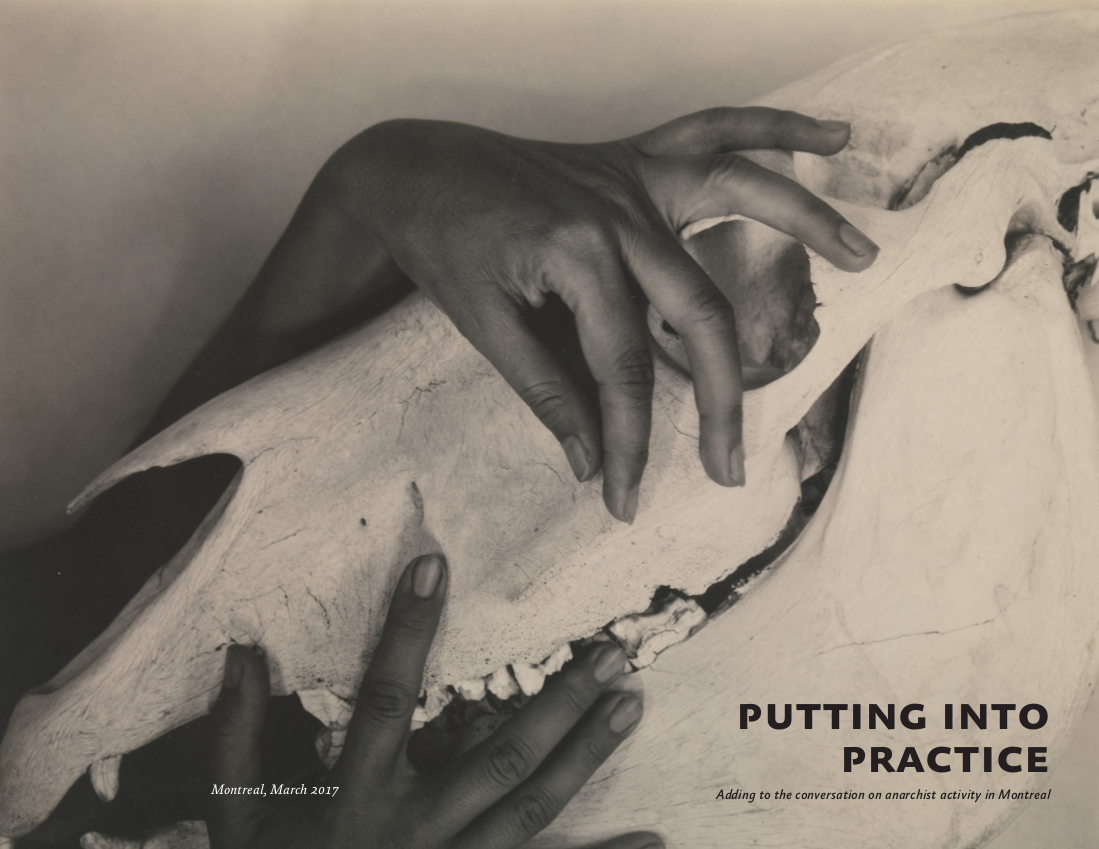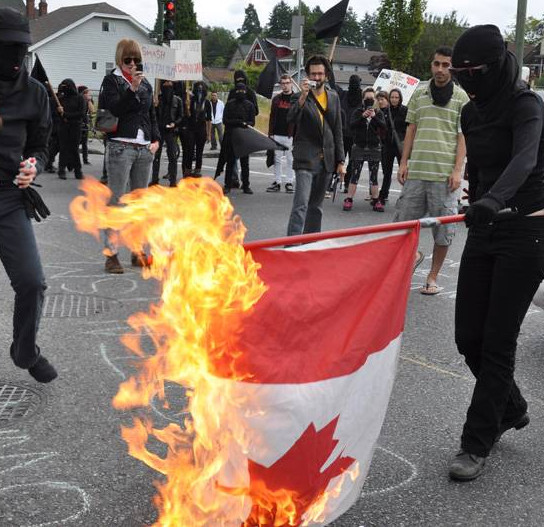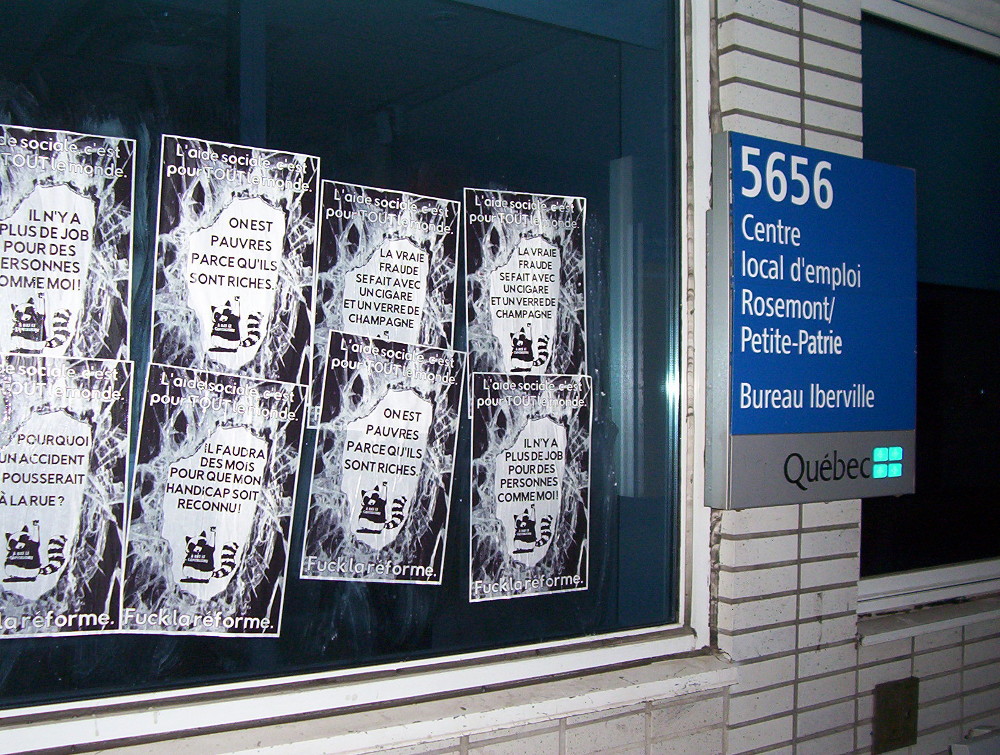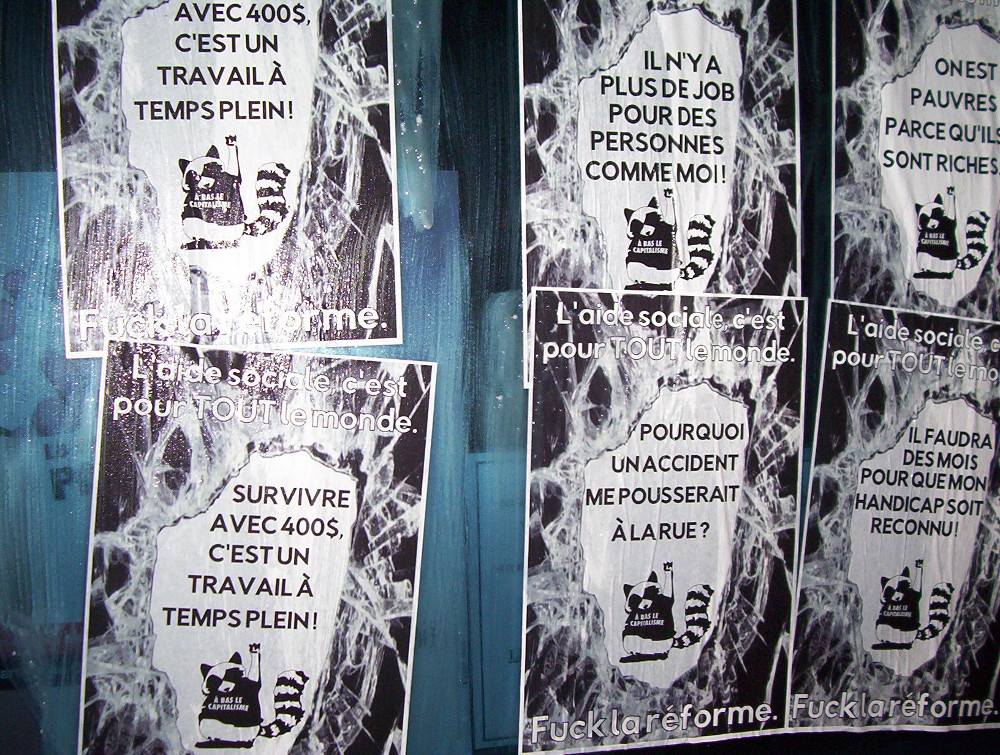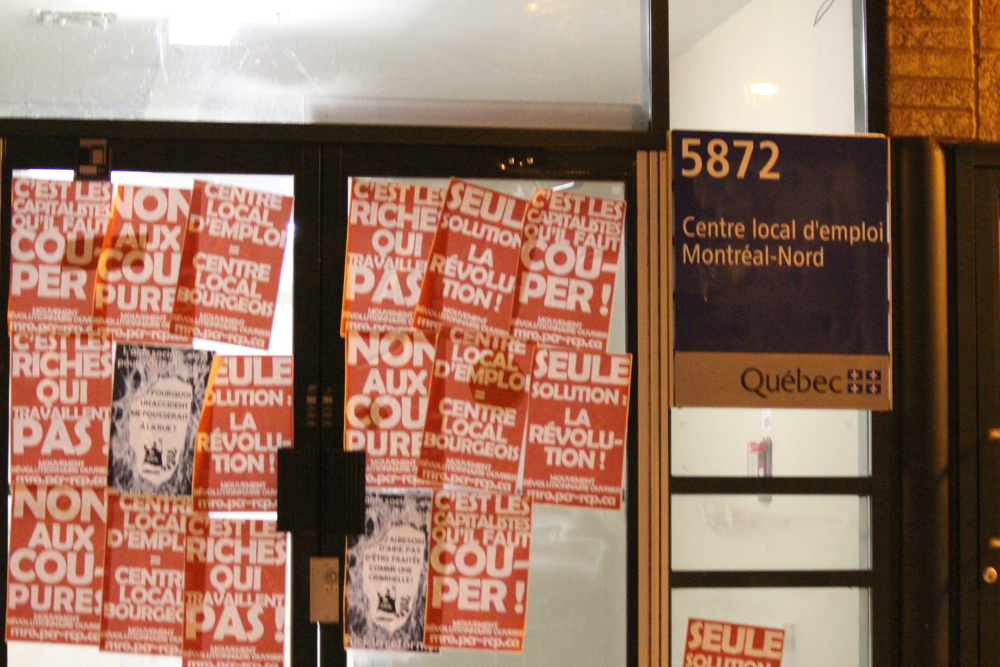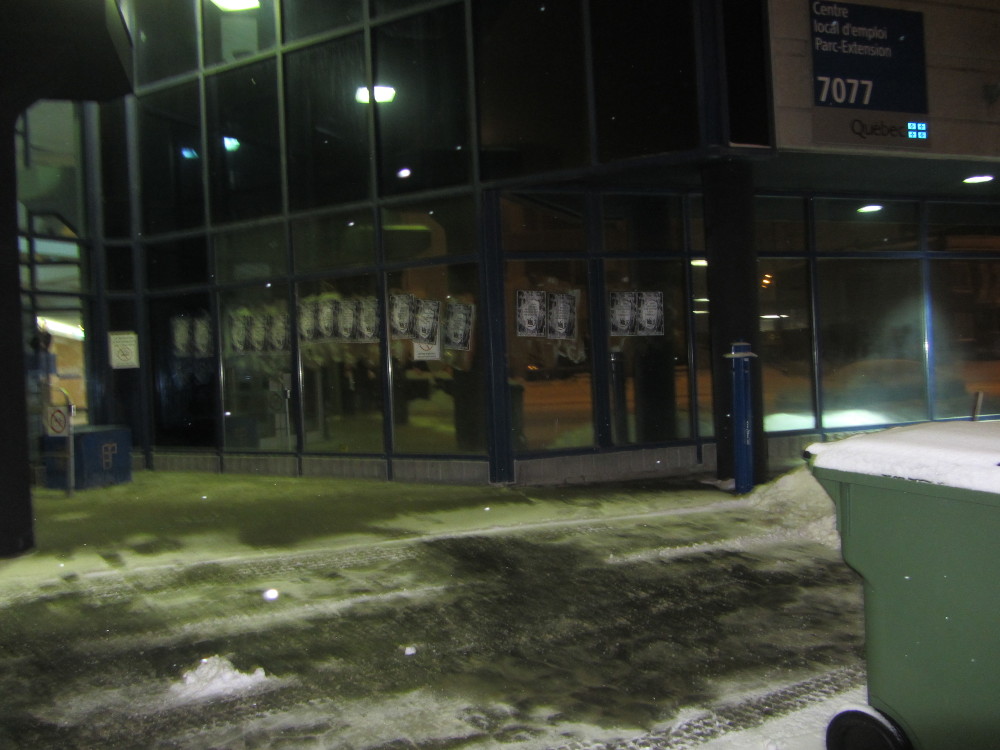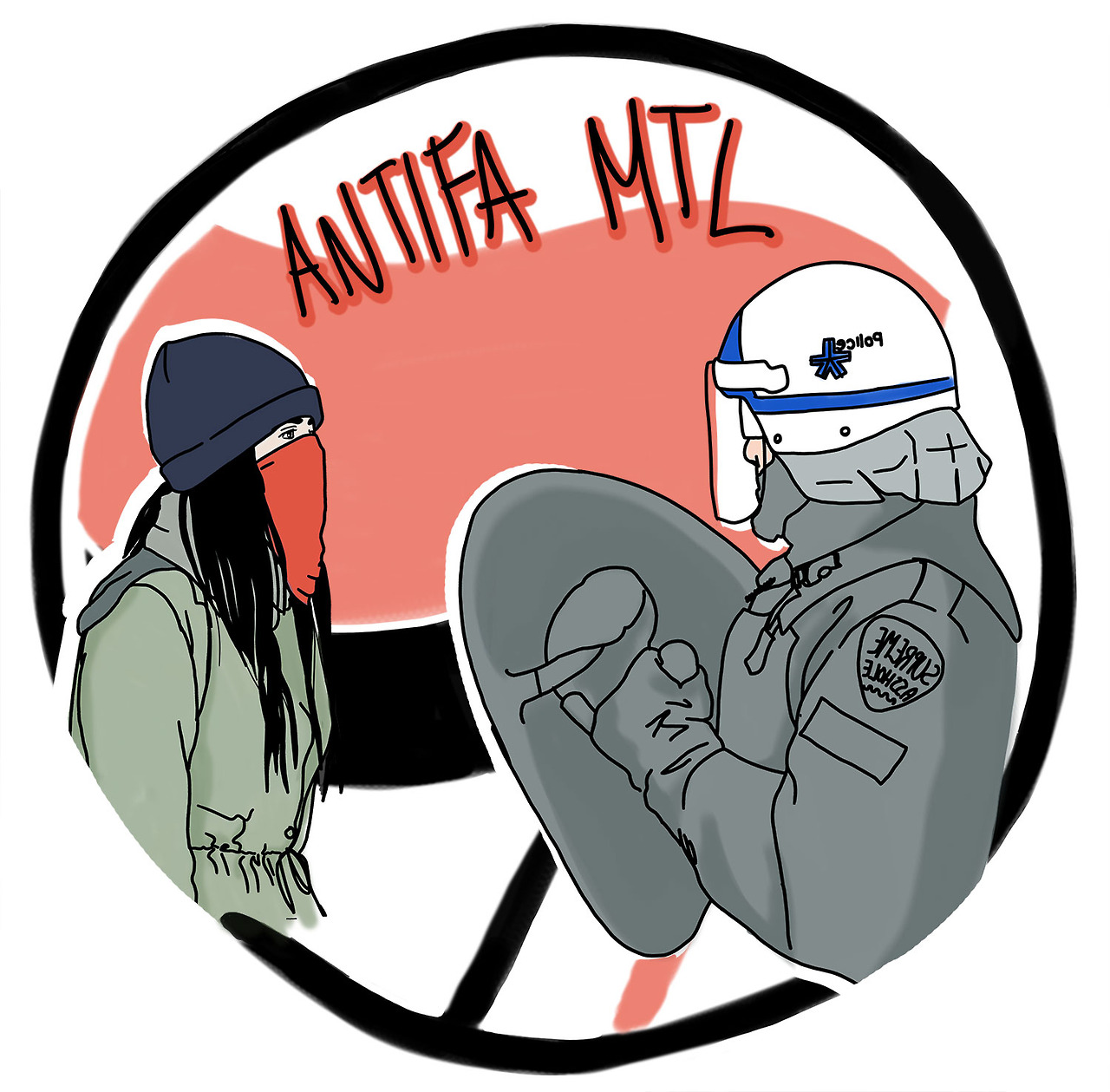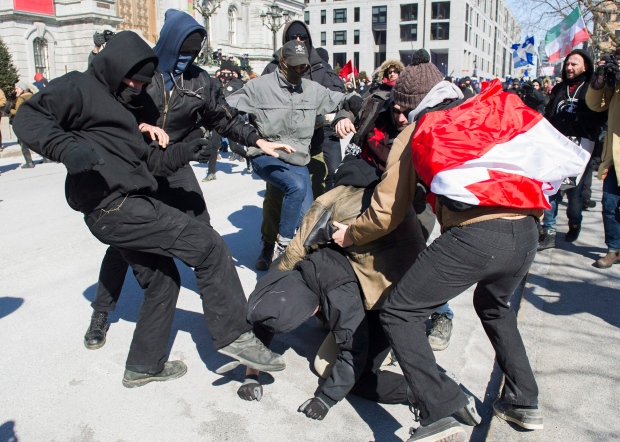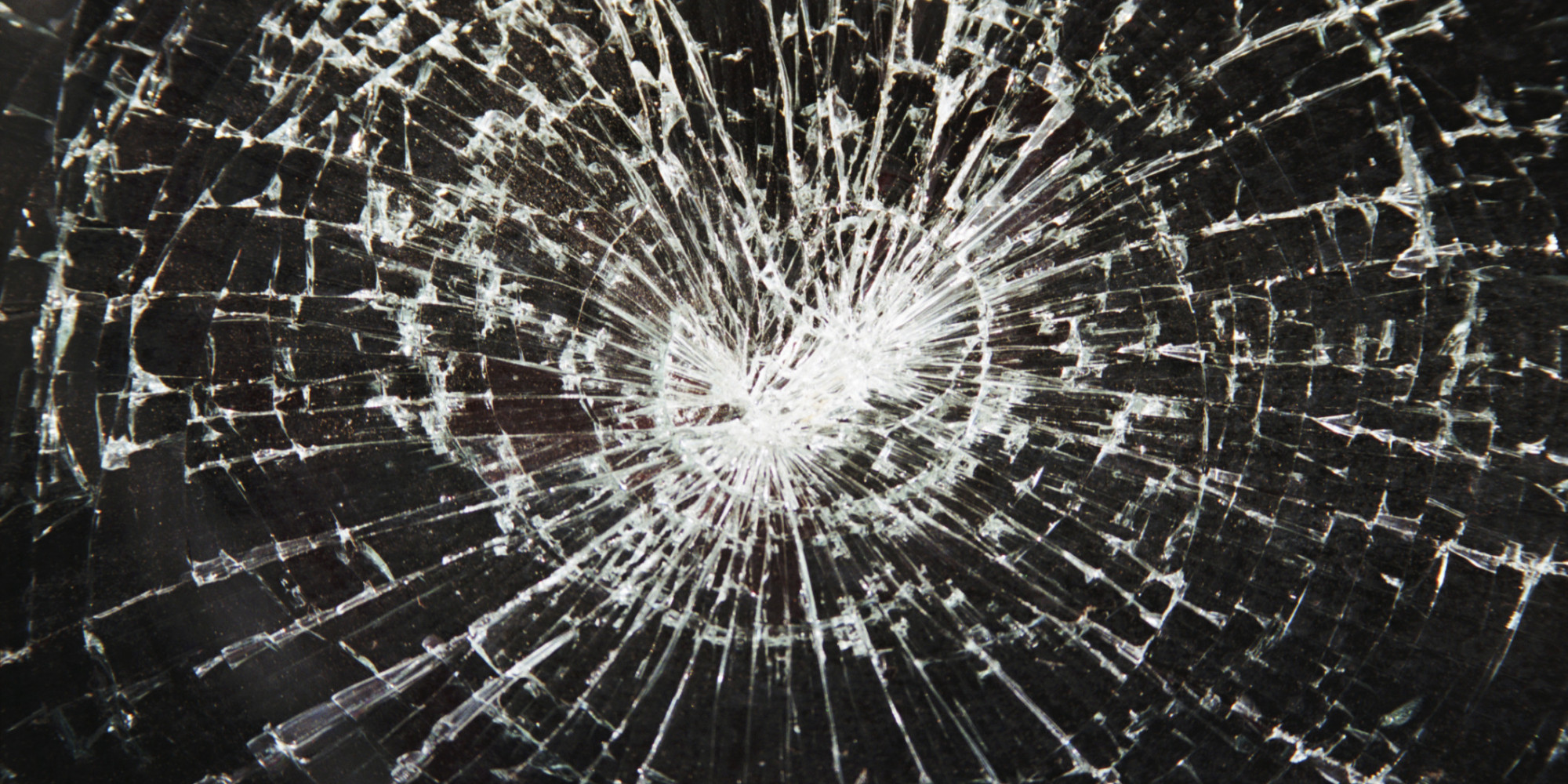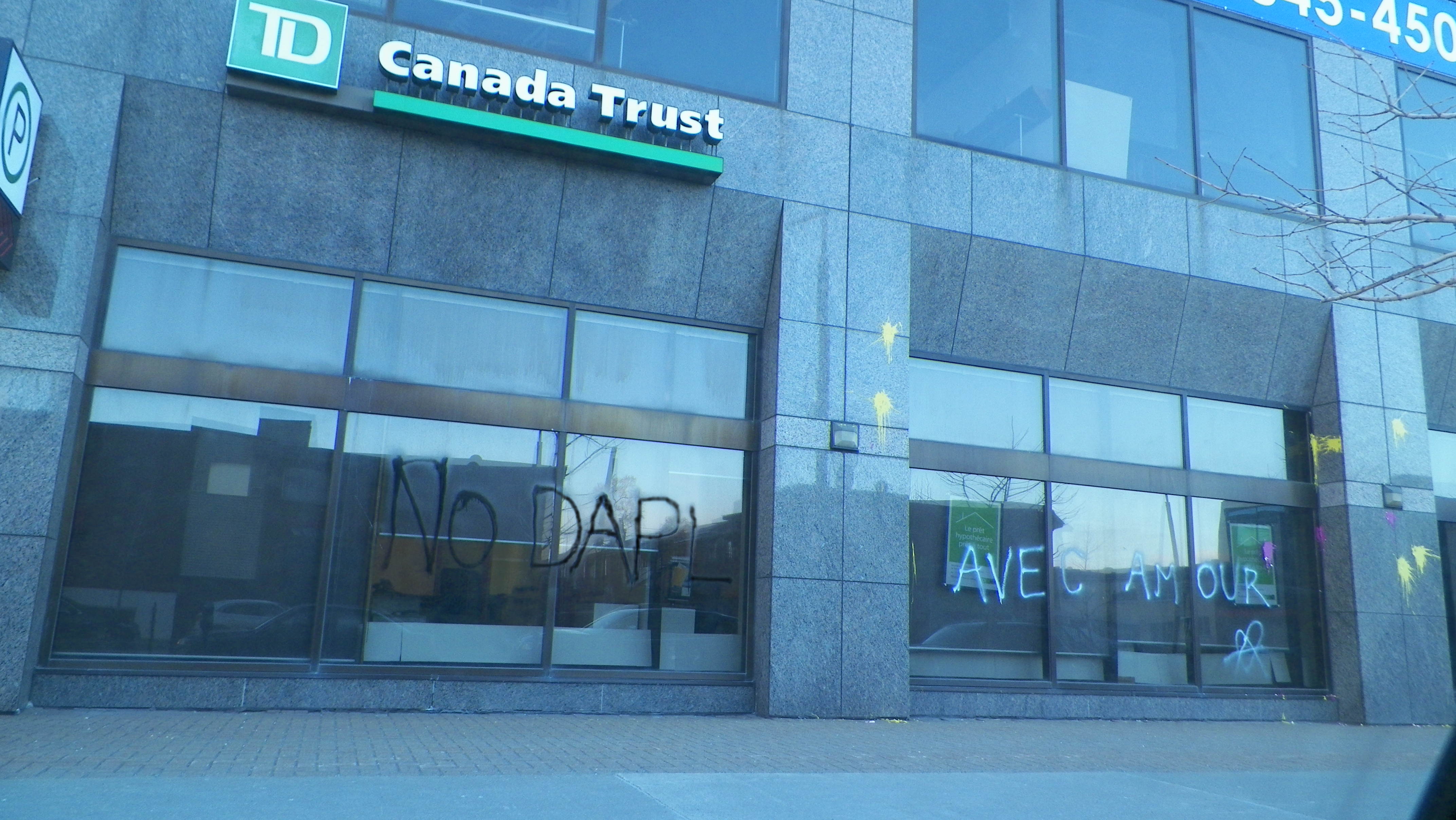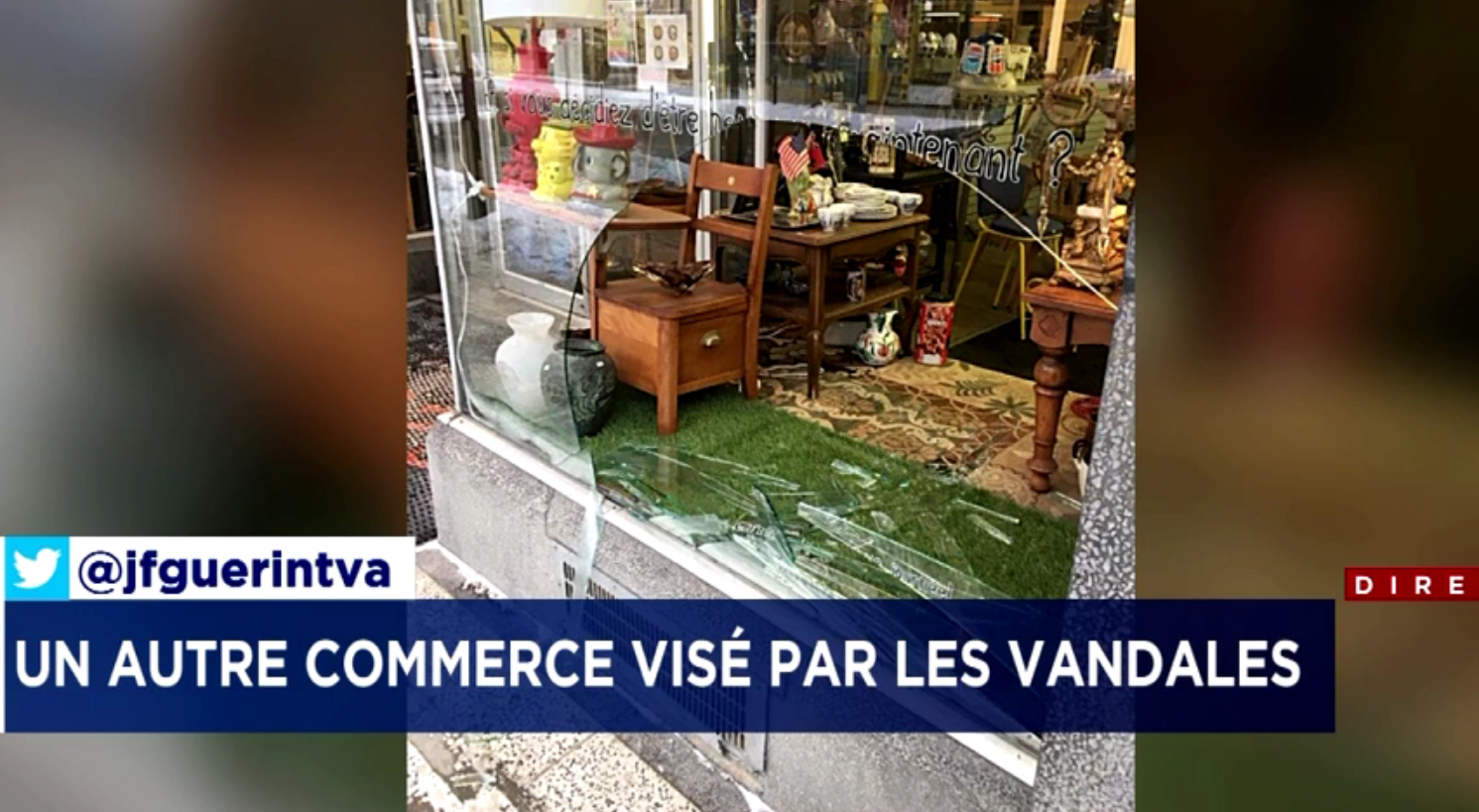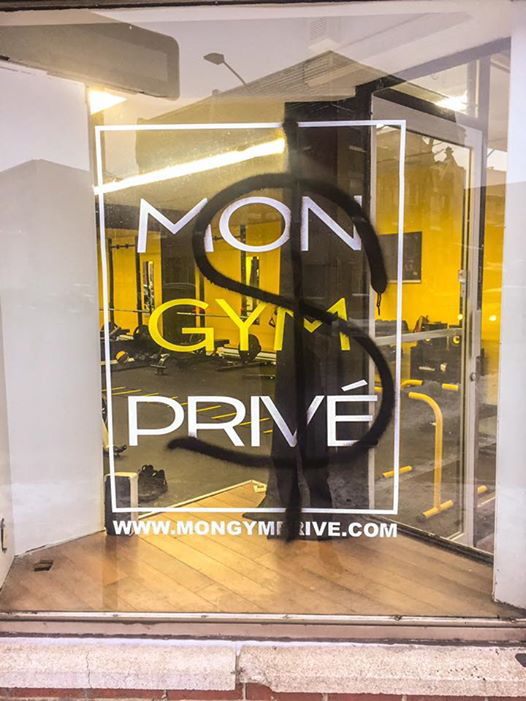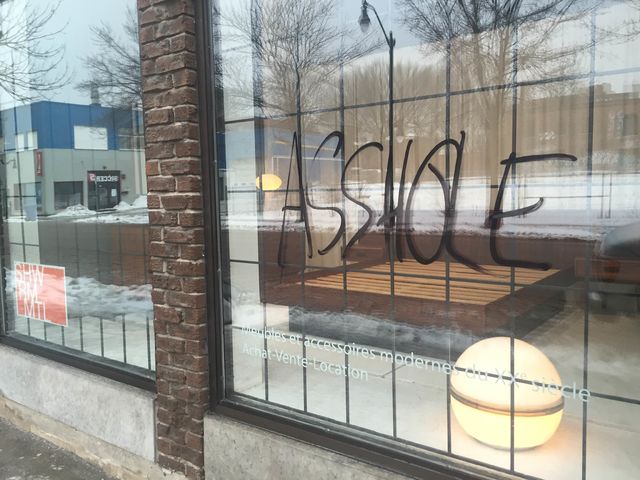Anonymous submission to MTL Counter-info
Download and Print Here
We’d like to respond with our thoughts to a text Mise en Commun (Putting in Common) that has been circulated critiquing insurrectionary projects and perspectives in Montreal. We appreciate that the authors of Mise en Common want to elaborate similarities and clarify differences, and move past bad faith. We’re taking this as an occasion to respond and to clarify ideas that we’ve been reflecting on for a few years now. We’ll try to use points of difference with Mise en Commun as an opportunity to delve further into ideas and how they inform practices, rather than limiting the scope of our text to simply addressing the critiques. We recognize that the length of this text might not facilitate a simple back-and-forth with the original authors, but our goal is to contribute to a larger discussion about these questions. We hope others will feel compelled to participate in this process of clarifying ideas and directions.
Mise en Commun makes reference to and responds to several dozen actions, attacks and small demos that were carried out in the neighborhoods of Hochelaga and St. Henri by anarchists over the last year (which have a continuity going back several years now). These actions which we’ll reference herein mostly involved destroying the facades or merchandise of businesses and apparatuses that contribute to gentrification: yuppie businesses, police, the offices of developers, luxury cars and surveillance cameras. Most of the actions we’re referencing were claimed with a communique that was published on the internet or printed and distributed in paper form (sometimes scattered in leaflet form at the site of the action) explaining the action, how it was carried out, and situating it within the particular context it occurred in. As far as claimed actions go, there was a spike in the frequency of these types of actions in 2016.
We’re going to look at how these actions are placed in the context of neighbourhoods with tensions around gentrification, what this means for anarchists who want to intervene here, and what we think this has contributed to. Through this grounding, we’ll engage the questions of communication and intelligibility, mass movements, anarchist intervention, strategy, isolation and specialization, individual freedom, and repression. We’ll then make several proposals for a multiform and combative struggle against gentrification, along with other struggles that the Montreal anarchist space could pursue.
Intelligible to whom?
“To have resonance, our actions must be communicable, to make sense for others, they must be intelligible.”
– Mise en Commun
We certainly agree with elements of this. In acting, one of our primary considerations is how our actions will be understood, both by comrades and anyone else who encounters them. However, we want to be clear about to whom we are intelligible. We want to communicate with potential accomplices, people who, when they see or hear about the actions, resonate with the need to undermine that which grinds them down and makes their lives miserable, those who want to fight back. We want to be unintelligible to authority – we don’t speak their language and don’t want to, because we don’t want to fit in their paradigm so as to enter a dialogue. We want to destroy them.
Even when actions speak for themselves (and certainly some actions speak more clearly for themselves than others; this is ok) we can’t rely on the leftist or corporate media to diffuse our ideas – the goal of those projects isn’t to communicate ideas, but rather to reinforce their own worldview by incorporating our ideas or actions into their narratives. It’s necessary that we develop and utilize our own channels of communication in order to be clear about what we’re doing and what we want, and to avoid censorship.
Accompanying an action with a communique can help clarify the actors’ intentions, to demystify the means by which it was carried out and to situate the action within a broader struggle or strategic line. Claims for many of the actions we’re referencing were published online on Montreal Counter-information, a local infrastructure project of autonomous communication for our struggles in the Montreal anarchist space. Of course, this often comes up against the limit of only being engaged with by other anarchists. One way the project appears to address this limit is to make printable versions of the communiques that can be posted up in the streets, and circulated through distro tables and among apartments. This attempts to open lines of communication with people who don’t exist in the same limited channels of the internet that we do.
The language of war & the spectacle
Mise en Commun criticizes the authors of an anonymous communique for “speaking of an act of war while claiming the vandalism of five businesses”, accusing the actors of fetishization of terminology, pretension, and dramatization of their own power. Generally, when we speak of war (at least one that we ourselves might be engaged in), we tend to be referring to social war – the expansion of conflict to every aspect of life, just as domination and capitalism extend beyond the real subsumption of the workplace. This social conflict is necessarily open-ended, chaotic, and contains within it an exponential growth in possible complicities. This war is an underlying reality, one which we seek to make visible through our actions and propaganda, though we must note that our own engagement with this war constitutes but a small fraction of it. The actors also explained their ‘act of war’ in writing “We will not let these boutiques install themselves here peacefully. This facade of peace is nothing more than an attempt to make invisible the war in progress against poor and marginalized people.” However, we should be conscious that ‘war’ is also the language the State uses to describe conflict, and wars often have truces and standardized logics, whereas the war we want to wage is permanent, and outside militaristic conceptions of struggle.
The critique also implies that the action was claimed in “grande pompe”, creating a spectacular situation. After this particular attack, the mass media did republish the claim in part, though this is completely out of anyone’s control and shouldn’t be blamed on the actors. Media selectively quoted “act of war” to create a spectacle – this reduction of nuance to a tagline is an inevitability when the media seizes onto actions. Of course, certain decisions in how we act or communicate can reinforce the spectacular nature of actions, but we don’t believe that every effort to accompany actions with words constitutes solely reinforcing the spectacle. The process of communication is inherently a symbolic matter, so on some level, any attempt to communicate could be dismissed by calling it ‘spectacular’. On the flip side, if we choose never to speak, someone will speak for us, using our ideas and actions to control the narrative, paint us as isolated and reinforce their own projects or worldviews – politicians, the mass media, leftists.
As we’ve mentioned, one proposal for combatting this dynamic is by attempting to open up as many direct communication channels as possible, through graffiti, posters, newsletters, autonomous online media projects: getting communication off the internet and into the streets. We find it strange that some people would blame anarchists for carrying out actions that are picked up on by the media, while making no proposal for how to undermine the impact that the media has on how our actions are perceived.
We also want to complicate a reduction of confident language to “the staging of our power” [Transl. Mise en scène – to stage a play]. It might also be helpful to point out that the current and local socio-cultural conditions, influenced by a puritan ethic, teach us to practice modesty when speaking from our hearts. In mainstream society, certain youth are allowed to think of themselves as the centre of the universe until they’re beat into submission by hard economic realities and social roles. In this context, people prefer to allow celebrities and international struggles to have all the glory and to be fetishized as objects. With this in mind, we reject a practice of modesty when fighting against that which destroys us. When we speak in a heartfelt and proud manner, with respect to actions that we pour our passions into, we can only hope to normalize a love for oneself and our life’s passions as a subversive act. Finding unmediated ways to interact with our own desires is in fact a great way to diminish the power of the spectacle, rather than reinforcing it. CrimethInc. is often critiqued or poked fun at for embracing these qualities in their writing, but they might have been on to something. If pride can be limiting, it’s more so if it becomes an obstacle to self-critique and learning, or in our interpersonal relationships, and that’s where we’d prefer to address this problem.
Mass-movement and popular anarchism in Montreal
“…We’ve had enough being on the heels of a context, waiting for a student strike or the construction of a pipeline… The context that favours us, the arena where we fight, the territory we inhabit, it’s ours to create.”
– Mise en Commun
We completely agree with the statement above, and it influences all of our projects. The time to act for freedom is now.
Mise en Commun goes on to state that “It’s not in social movements that we look for [power], but rather in insurrectional moments”. This is where we differ. We don’t want to replace the Grand Soir with an anticipated insurrectional moment on the horizon, again deferring struggle into the future. Even for those who believe that collective power is only to be found in future insurrectional moments, it remains meaningful to act outside of such moments with the goal of preparing oneself for them, of laying the groundwork for them, of fomenting them. By honing our practices in the present, our capacity to intervene in future (often unexpected) occasions will be kept sharp.
Mise en Commun makes a full-circle contradiction by only mentioning the 2012 student strike as a concrete example for an insurrectional moment. April and May of 2012 is considered an insurrectional moment “not only in the sense that shit was popping off every night, but also in the sense that our relations were defined in function of, by and for the strike.”
We differ in thinking that 2012 was an insurrectional moment. We’d define an insurrectional moment as a violent creation of time and space which breaks with social roles and normalcy. If the situation at times approached being uncontrollable, it’s not because the student strike defined our relations, but in fact the opposite – because the struggle spilled out of the confines of the demand-oriented strike and the student identity after the repressive laws came into effect. Although our collective capacity for street-fighting was creatively expanded in many moments, this ultimately wasn’t matched in uncontrollable ideas or in the subversion of social roles. All of those broken windows and injured cops were successfully reframed as militant reformism, and all momentum was recuperated into electoral politics without so much as a hiccup. Our main reflection on our interventions in those months is that we didn’t put enough energy into engaging on the level of our anarchist ideas and making them relevant to the situation.
It would be obtuse to claim that no liberatory power was felt in those moments. But it would be a great tragedy to not admit the ways in which we betrayed ourselves and potential accomplices by putting our radical perspectives aside in order to respond to a sense of urgency. Even in May of 2012, it was uncomfortably clear how largely white the faces of the so-called mass were in a very multi-cultural city, in a struggle that presented itself as class-based, while lefty liberals honked the horns of their Mercedes’ in support of those disobeying repressive laws in the streets. Privilege politicians might look at such a reality and make the same mistake all over again – affirming that we need to put our individual desires aside for a demand that extends the liberal social contract (with its rights, privileges, and powerlessness) beyond the standard white-supremacist framework. But if we are to take ourselves seriously as anarchists and speak of “a culture of struggle” from our perspective and not that of a politician, let’s hold positions that make fewer compromises.
In certain moments, actions taken and claimed by anarchists have alienated and made collaboration impossible with the Left; in a certain sense, this is desirable. We think that building a revolutionary culture of struggle necessitates, not alienating every single leftist, but rather sabotaging the Left’s hold on struggles. The Left is one of the primary means by which previously uncontrolled struggles are recuperated, by diverting their energy into mediation with the authorities, and patching things up. Anarchists should engage with the Left as a barrier to liberatory perspectives and practices. A certain form of populist-leaning anarchism – inherited from the Left, and in the case of Montreal, militant student organizing – is in our view one of the greatest obstacles to anarchist projects in Montreal.
It seems to us that anarchists take this more “popular” route because they want their projects to be imbued with the social legitimacy of ‘the public, the people, the non-anarchists, etc.’. Individuals in our society are taught to feel valid only through recognition from something they admire, which they perceive as more powerful than themselves alone. Everyone is sensitive to this and that’s in part why authority still exists – it’s not simply the master’s fault. Everyone plays a role in the hierarchy. Rather than trying to break the roots of this domination at the base, populism and leftism exploit and play into this human weakness in order to create a movement. The result is a reproduction of social relations in which one acts primarily out of fear of rejection or repression if certain boundaries are overstepped. This is one way in which repression functions – every individual is afraid to be publicly shamed or isolated in prison. Within the trap of these boundaries, pacification will always win.
Comrades who subscribe to the logic of normative legitimacy oftentimes accuse those who carry out direct attacks of making their project impossible by not caring about this public legitimacy– attacks aren’t valued as a way of contributing to a context. This propagates the idea that some ‘dangerous’ acts made at the wrong time could destroy the growth of the movement. This proved true in Athens, Greece following the Marfin Bank arson (where workers died in a fire started by anarchists), but in Montreal, it seems the criteria for ‘dangerous’ is stepping outside the dictates of normative legitimacy, which we understand as integral to our project.
Looking for normative legitimacy can only invisibilize conflict in the long-term. However, if we can socially spread narratives of the legitimacy of our practices in ways that break with normative values, we come into a great, subversive power – when many other people think it’s legit to fight cops and occupy buildings, and not legit for cops to shoot us or landlords to evict us. More is possible when there is social support for our actions and when more people are breaking out of their roles and participating in struggle or illegality. This will necessarily clash with normative legitimacy – we can see an obvious example of this irreconcilability in how ‘violence’ in normative paradigms is used to designate anything with a semblance of a revolutionary horizon. It’s just as important that comrades are putting energy into arguing for the legitimacy of our practices as it is to be experimenting with practices – not with the media or politicians, but horizontally, in the streets, with neighbors, and undermining the legitimacy of the practices of the State.
Limiting ourselves to the guide of the public contains our struggles to the imaginaries of politics and the normative dictates of legitimacy. We need to make a bigger effort to act and think outside of the box, and we need to develop our own narratives and sources of meaning without being dependent on projections of ‘normal people’ – the ‘public’ is an imaginary figure useful only for social control. Domination and populism act in similar ways: by building collective values, using ‘intelligible’ ideas by and for ‘normal’ people, and absorbing and recuperating the energy of revolt. We want to nourish chaos by exploding this energy out of any structure, code, or law. To be clear, we believe that attacks need to be made and evaluated with an eye towards their resonance, and actions don’t resonate if they are unintelligible to everyone but their authors. The question then becomes how can we be sensitive and receptive to the resonance of our actions without assuming what other people will or will not be into, and thus not allowing the figure of the ‘public’ to guide our actions? We can only answer this question through experimentation.
While it’s worthwhile to find ways to interact directly with others outside of our youthful and subcultural milieus, people shouldn’t focus on organizing others into some mass-movement in order to feed their sense of legitimacy, but should organize themselves, and be clear with those we interact with about who we are and what we want. Politics (and the omissive and manipulative discourses it requires) should be avoided when building anti-authoritarian foundations.
We think a critique of the left and of populism could bring interesting reflections to social anarchist initiatives, like that of Chlag.info, which organized an assembly against gentrification in Hochelaga. From our understanding, one of the goals of Chalg.info is to build a revolutionary context in the long term, and to create a culture of struggle composed of all kinds of tactics, in order to make acts intelligible. We share this goal. They do this by reaching out to community groups, distributing propaganda, and organizing popular general assemblies against gentrification. We appreciate that they make no demands of the State, and explicitly support a diverse and solidaritous approach. We recognize that those initiatives are helping to create a social context and the long-term dimensions that are being considered, but the populist language utilized in those initiatives warrants criticism.
Elements of the failed framework of anarchists mobilizing the masses of students into a strike against austerity seem to have been transferred into mobilizing the masses of a neighbourhood against gentrification, so that some day in the future, direct actions can be embedded in this social-movement context. This framework functions through politics: a logic of recruitment, a deferral of struggle into the future, and the creation of a lowest-common-denominator point of unity publicity campaign. Whether ‘Fuck austerity’ or ‘Fuck gentrification’, ideas and differences are reduced to a political program designed to appeal to a ‘mass’. Where gentrification (or any specific struggle) offers an opportunity for us to link this struggle to anarchist perspectives that put everything into question, this political approach instead chooses to not make any of these connections or challenge the normative and respectable leftist discourse against gentrification.
Connecting this struggle to an analysis against all government, policing, colonization and social control, for instance, is thought to likely alienate many people in the projected social mass, and detract numbers from the base of supporters of a lowest-common-denominator cause. When these connections are drawn, they are limited to progressive arguments: the Chlag.info flyer “What is Gentrification” highlights the hypocrisy of specific politicians working in hand with the business elite, and the increased police presence in the neighbourhood to eliminate undesirables, while never positioning themselves as wanting a world without these institutions. The text positions the State as not being sufficiently social-democratic, and there’s no mention of what it could look like to struggle against it too. The attacks on businesses are not defended as important contributions to this struggle, but only mentioned to denounce that the city gives money to the targeted businesses and not the less fortunate population. Although the mobilizers are likely correct that their approach will bring more numbers to their ’cause’, they’re setting themselves up for recuperation by not broadening their arguments to anarchist critiques, and sacrificing quality to quantity.
The text “A Wager on the Future” puts it well :
“Anarchist ideas are more complicated to explain and more difficult to accept, because all the education and information people have absorbed throughout their lives is produced by various social structures to support the fundamental beliefs of the State, patriarchy, and capitalism. It is much easier to use progressive arguments… if you want to convince people quickly. But faced with a movement animated by such arguments, the State would have no problem redirecting or recuperating it via a reform, because these are not radical critiques that get to the root of the problem…
“…Often, the obsession with recruiting or creating a large anarchist organization or “capacity for mobilization” is nothing but a substitute that hides an absolute lack of struggles of our own. In struggle, we deepen our ideas and practices and we encounter new comrades, new complicities. It is often the people who have no struggle in their daily life, who don’t know how to find social conflicts, who propose creating large organizations based on recruitment, or creating a mobilizing capacity based on seductive techniques of communication.”
Chlag.info has one of it’s objectives to “Increase awareness among families and friends of the transformations which estrange us from our own neighbourhood”. Such a simplistic narrative of preserving ‘our own neighborhood’ (an idea that relies on a micro-nationalism) doesn’t challenge any possible xenophobic and reactionary directions from the largely white and often Quebec-nationalist residents of Hochelaga. With Chlag.info not specifying an anti-nationalist analysis of these transformations (and not even having any of it’s online content available in languages other than french), it wouldn’t surprise us at all if many residents understand this to mean non-white people coming into the neighborhood that they grew up in.
Although many anarchists participate in the group Chlag.info, they maintain a populist discourse that’s not honest about this. We find this front-group mentality of hiding one’s real perspectives behind a socially acceptable veneer to be parallel to the strategy of maoists. At the assembly against gentrification, someone from the neighbourhood asked the organizers why they were pretending to be ‘the people’ when they’re actually a bunch of anarchists from UQAM. We think it’s great that anarchists are fostering spaces for people outside our circles to organize themselves, but if they’re not genuine about what they have at stake in this, the dishonesty is apparent to everyone.
The question of to what degree actions such as a popular general assembly or even a rent-strike foster a revolutionary culture (rather than strengthening the Left) is a matter of whether we are honest about intentions from the get-go, or whether we play the game of social democratic values to get people who are more used to these kinds of legitimacy-games on our side. Contrary to the romanticization of “opacity” against structures of power (that then gets applied to anyone outside of the ‘milieu’) that we often hear being used to justify dishonesty about one’s perspectives, we believe that wearing our hearts on our sleeves will go a lot further in the long run than hiding our intentions behind the facade of the responsible community organizer, or syndicalist militant, or whatever else.
One of the ways we see anarchist populism reproducing normative legitimacy is in its marketing of ideas, which presents them in a lowest-common denominator way. Our strength does not lie in the form of publicity campaigns. Marketing will always be the terrain of power because it makes us just another advertising campaign, using the language of politics – tired and palatable explanations of why austerity (or gentrification) is bad. Having more people passively ‘agree’ with ideas isn’t interesting to us – democracy’s pacifying strategy makes any opinion acceptable, as long as it’s not tied to a practice. We certainly want to encourage intelligent critiques of power, but all those critiques are already out there, and more accessible than at any time in the past. Populism understands propaganda as the primary means to spread anarchy, but anarchism will only spread if it can exercise a force against the dominant structures, if it has a practice that actually feels relevant to people’s lives and up to the challenge of our times. If our ideas and practices aren’t spreading, it certainly isn’t because we just need more rationalized arguments against the nightmare surrounding us.
More than convincing people to change their opinions, we’re interested in contributing to motivating them to develop subversive practices, and motivation is a fundamentally emotional force. Marketing certainly also mobilizes emotions, but the deeply-emotional dimensions of anarchist ideas differ by inspiring autonomy, agency, and empowerment. We feel freedom, dignity, anger, compassion, joy, and empathy, and these feelings bring us to want to live in liberatory ways. These feelings and practices for manifesting emotion might actually speak to people as their whole selves, and validate their own emotional realities, rather than understanding them as a statistic to be convinced.
The Question of ‘Strategy’
“We don’t believe that there exist pure ‘anarchist practices’ nor anarchist struggles ‘in themselves’: there are anarchist perspectives on struggles. To hold onto the fantastical purity of certain types of action, outside of any relation to a context or a struggle, only elevates them as a dangerous fetish. Quickly, we start to think of action for action’s sake, rather than for the power that we can get from it. An accomplished action calls for the organization of the next, without ever anchoring itself in a more long term perspective.”
– Mise en Commun
We agree that there aren’t pure anarchist practices. Of course, there are no inherent intentions in breaking a window or setting a fire, and no one is claiming that. But we are interested in spreading combative practices that undermine social control (which aren’t limited to night time attacks), and these being imbued with anarchist perspectives. The anarchist perspectives which feel closest to our own emphasize conflict with authority and hierarchy, self-organization and autonomy, relationships of solidarity and mutual aid, an expansive conception of freedom that sees it as relational to all beings, and the rupture of social peace and control.
We agree with Mise en Commun that “The context that favours us, the arena where we fight, the territory we inhabit, it’s ours to create.” Direct actions taken in neighbourhoods with high tension and histories of resistance to gentrification, are interventions in these contexts and serve to push the limits of what is possible – and are hardly “outside of any relation to a context or a struggle”. It seems that the criteria for context or struggle here is relying on Leftist movement conceptions where the quantitative logic prevails; that if there aren’t masses in the street, there is no context. In the same way as destruction ‘doesn’t have revolutionary significance in itself’, neither does a social mass.
Self-organization and direct action give us power in many ways, which shouldn’t be flattened into serving a singular type of context or strategy. Acting has impacts on oneself; developing a feeling of freedom, healing, learning skills and honing practices, and bringing us moments of joy. The impacts are also felt collectively among those who organize together; developing empowerment, communication, complicity, and different forms of relationships. There are impacts on potential accomplices; through inspiration and solidarity, overcoming isolation, and contributing to wider sentiments, for instance, against the police, and the popularization of practices used to manifest them. There can also be impacts on the enemy; by sabotaging the tools of domination we can impair their well-oiled functioning, and give more space for free relations to flourish.
***
“The mystique of an insurrection that spreads, we must understand it, demystify it, analyze it, and foresee it… It is necessary to always be one step ahead on the recuperation of our struggles, on repression, to be aware of the sensitive changes in the relations of force that we seek to overturn. It is necessary to predict the consequences of our actions, to learn to recognize what benefits us and what harms us, to play one’s card right no matter the situation – changing the rules to get there. It’s necessary to conspire, to be strategists and not only tacticians. Not strategists at the head of an army, but an army of strategists.”
– Mise en Commun
Mise en Commun continually returns to the tautological aphorism that we must be strategic in our actions to feel our collective force, while rarely concretely stating what this strategy actually means to them. Where Mise en Commun treats strategy as a prerequisite for action, we understand action as a prerequisite for building strategic intelligence, by opening up space for creativity and mistakes to be learned from. We’d also like to critique that Mise en Commun uses the word strategy as if it signifies something that’s self-evident and common, instead of anchoring it in their own perspectives rooted in experience, which leads to a homogenizing conception of strategy. In many ways, Mise en Commun mostly offers truisms and no concrete predictions or strategies. The text only denounces the supposed errors of others, without engaging much of anything specific with depth or nuance (which we imagine is, in part, a consequence of the brevity of the text).
Mise en Commun reinforces a conception of strategy that is clearly influenced by marxist materialism. It wants us to understand our struggles like a chessboard, where we have an aerial perspective on ‘objective material conditions’. Even in the less authoritarian manifestations of this, where each piece has agency and no one is a ‘pawn’, we take issue with the vantage point, and it’s tendency to devalue autonomous initiatives. This vantage point strives for a homogenous understanding of strategy – one could even say a science – that can be ‘objectively’ applied in all situations. Such a science is inevitably determined by some elite, and renders other stories irrelevant. In our experience, such strategies are more often utilized to tell us ‘the time is not right, the conditions are not in place’ than to inspire offensives against authority.
We might contrast such a science of strategy to a heterogenous anarchist space that can experiment with divergent perspectives yet still find overlap. What happens when two strategists in the army of strategists disagree? Either they denounce each other as unstrategic or they must explicitly adopt the view of expansive and multiple perspectives.
We propose an alternative framework for thinking about our goals and paths as perspectives and projectuality. We agree that we should make an effort to analyze our context and how it changes, to think about potential consequences of our actions on that context. We also agree that this can lead to perspectives and projects with long-term dimensions. This often gets called projectuality in insurrectionary jargon – though this isn’t to say that we think the difference is only a matter of words, there are serious differences in the ideas that underlie them.
We disagree that we can always predict the consequences of our actions ahead of time, like moves on a chessboard. Our projects are experimental; we set certain intentions, words, and acts, and engage them in the social terrain, without much certainty (aside from educated guesses) about the results. We can only guarantee our own actions, and attempt to place things out there for others to grab ahold of. Such a search for certainty of prediction seems to come from being confronted with the overwhelming and perhaps hopeless obstacles to our projects of liberation, and needing to feel in control of something. It’s an understandable but misplaced belief that our actions will have an easily predictable impact, if we just wait for the “right time” or find a formula for struggle.
We believe that visions of strategy that don’t explicitly affirm divergent perspectives will lead to the centralization or the bureaucratization of the insurrection. Heterogenous projectualities better embody anarchic ethics by not sacrificing means to goals. Our goals are embedded within our means: to further projects that make the terrain fertile for the spreading of combativeness, nourish any quality of struggle that is self-organized, put an end to dialogue with the class enemy, or normalize values and practices that undermine domination and exploitation.
Mise en Commun patronizingly argues that the actions in question haven’t contributed to ‘building a collective power’, presumably because the actions fall outside of the author’s strategy. It’s self-evident to us (if only through simply reading the communiques which have accompanied various actions that Mise en Commun appears to be in response to) that the actors behind some of these attacks are feeling and building some type of collective capacity. Even in a worst-case scenario where it seems that it’s always the same people doing actions, and things aren’t becoming contagious, at least people are building a combative network amongst each other, and subversive ideas are easier to engage with because they’re felt in reality.
We want an expansive anarchist struggle, in which our actions widen the imaginary toolbox of how we can manifest our discontent or creative energies, outside of reformist channels. Although we don’t think this will magically cause our actions to spread across the social terrain overnight, we do think it can have an impact when things do boil over.
The 2010 piece “Signals of Disorder: Sowing Anarchy in the Metropolis,” outlines the titular proposal and touts the benefits of regular, visible attacks against obvious symbols of capitalist exploitation, carried out in times of relative social peace. These actions plant subversive seeds in peoples’ consciousnesses which are later accessed and adopted during moments of broader social rupture. Even though most people won’t agree with these attacks at the time, they can adopt these forms as their own tools when traditionally valid forms of political activity are inadequate. Effectively an inversion of the “broken windows” theory of policing, the text illustrates the concept through the example of the insurrection in Greece in 2008 (though certainly we’ve seen anarchist tactics adopted by wide swaths of people during various insurrections on this side of the Atlantic in the last few years).
“An interesting feature of these signals is that they will be met with fear and disapproval by the same people who may later participate in creating them. This is no surprise. In the news polls of democracy, the majority always cast their vote against the mob. In the day to day of normality, people have to betray themselves to survive. They have to follow those they disbelieve, and support what they cannot abide. From the safety of their couch they cheer for Bonny and Clyde, and on the roadside they say “Thank you, officer” to the policeman who writes them a speeding ticket. This well managed schizophrenia is the rational response to life under capitalism. The fact that our means of survival make living impossible necessitates a permanent cognitive dissonance.
“Thus, the sensible behavior is not to reason with the masses, to share the facts that will disprove the foundations of capitalism, facts they already have at their fingertips, and it is not to act appropriately, to put on a smiley face, and expect our popularity to increase incrementally. The sensible thing to do is to attack Authority whenever we can.
“Attacking is not distinct from communicating the reasons for our attacks, or building the means to survive, because we survive in order to attack, and we attack in order to live, and we communicate because communicating attacks the isolation, and isolation makes living impossible.”
The author goes on to argue that, in the present moment, these signals of disorder serve us and our projects by increasing our tactical prowess and interrupting the narrative of social peace. In these minute reclamations of public space – anarchist graffiti, posters and flyers, attacks on businesses – we undermine the state’s goal of total social control of that space, making visible the presence of an opposition in ways that can’t be ignored or justified away. When we break small laws with impunity, we demonstrate to ourselves and others that the state is not all-powerful. This isn’t only meaningful from a personal and collective perspective, but an important sentiment to cultivate if we hope to be joined by others at some point.
The author also argues that by linking these signals of disorder to ‘the anarchists’, the reasons for the fight, the ‘anarchist critiques’, will be seriously discussed outside our own narrow circles. If this link to a recognizable social practice isn’t made, signals of disorder will be isolated as phenomena of urban white noise and can be legitimately and popularly policed with techniques reserved for inanimate objects and aesthetic aberrations. This link connects destructive acts (that resonate with the rage that has no adequate outlet in our society) to the community and solidarity that capitalism deprives everybody of (that resonates with the love that is even more lacking in possibilities for true expression). We will be kept safest from the right hand of repression and the left hand of recuperation when the connections between destructive and creative elements in the anarchist project are strongest.
Recent anarchist attacks against far-right figures connected to Trump, or a few years earlier on a smaller scale, attacks in Seattle targeting what everyone knew to be elements of gentrification, had a huge effect in getting people to take anarchist critiques—and perhaps more importantly, the practices that stem from those critiques—seriously.
We’ve also seen the intellectualization of ‘strategy’ serve to mystify situations that are pretty straight forward, leading to inaction by setting the bar too high for action or intervention. For instance, it’s not hard to understand why many people hate the police, and why it would be inspiring to witness other people offensively attacking them in your neighbourhood, and perhaps something you’d want to participate in the next time you see a demo in the street. Outside of the academy, there’s no need for a scientific analysis of why fighting back is desirable.
On ‘illegality’, specialization, and isolation
“What gives us power is not the level of preparation of a clique of experts in destruction… Like it or not, we’ve got to admit to ourselves that if there’s one thing that power knows how to manage, as much in the discourse as in the effective repression, is a crew of friends who isolate themselves in illegalism.”
– Mise en Commun
“The point isn’t to develop an “expertise” in destruction. All that this action required was some hammers, crowbars, rocks, and paint. And before that, a bit of an idea of where to arrive from, where to exit, masks and maybe some clothes that can be gotten rid of. We’ll find each other in the night!”
– from communique flyers thrown at metro stations Préfontaine, Joliette and Pie-IX and at the Place Valois in February on the day after the action.
Our struggles are nothing without the power of negation. We equally think that a struggle that is limited in conception to the attack is condemned to being in perpetual conflict without ever having a chance of actually destroying the systems we hate. Even if our individual inclination is to focus more on projects of destruction, to sustain and replenish this we need our lives and struggles to carve out spaces of autonomy, material infrastructure, and webs of solidarity and support.
The combative elements of a struggle will always be isolated by the authorities, this is inevitable. Certainly, those engaged in these forms of struggle shouldn’t reinforce their isolation. We’ve seen this happen when anarchists believe that negation is the only valuable contribution to a struggle, reinforce specialization, or act without regard to context and only care about relating to other anarchists internationally. However, it’s just as much the responsibility of anarchists with more social focus to fight against this isolation that will be attempted. This can happen by publicly defending the illegal actions, refusing the false dichotomies between good and bad anarchists, and by not hiding their anarchist politics in their organizing to blend in with ‘the people’.
In the context of the struggle against gentrification in Hochelaga, projects of anarchists who are more interested in organizing popular assemblies and doing other social projects are well positioned to do just that. After grocery stores in St-Henri were looted, POPIR (a St. Henri housing committee) publicly defended the actions. Chlag.info’s text “Why we don’t cry for broken windows” falls short of giving strength to the attack in November and breaking its isolation. They only say it’s an understandable expression of anger and inevitable given the situation, but miss the possibility of explaining it as an intentional act, by anarchists, embedded in a larger struggle and strategy.
Social support for attacks could also look like reading communiques aloud at popular assemblies or quoting them in their door-to-door mailbox publications, organizing the occupation of popular spaces or buildings while coordinating with anyone interested in defending them, and always pushing a discourse of the necessity of direct action and the refusal of reformist channels. The Montreal Counter-info communique poster series makes space for people to be actively complicit in whatever acts they find inspiring, without such complicity requiring doing similar actions themselves.
We think that we need to continue to break the narrative that anarchists are the only people who attack, and continue to make evident with our gestures, words and relationships how reproducible and accessible our actions are to anyone. However, as of yet, nobody has been doing actions that require intense technical expertise – smashing windows, and even setting fires, can be extremely accessible, given that all the materials you need can be found easily in your neighbourhood.
Mise en Commun falls into this specialization several times; “But we must take ourselves seriously, to be at the height of our adversaries.” ‘Being at the height of our adversaries’ can lend itself to the logic of the militaristic guerrilla, leading to war of attrition and the reduction of our project to the enemy’s frameworks. What does it mean for them to take themselves seriously, and be at their height? : “This means sometimes attacking where they’re not waiting, to surprise them and fool the anti-insurrectional apparatus that begins to be bloody well functioning.” It seems surprising to us that no one has been arrested for any of the actions in the last years if the actors weren’t taking this into account…
If merely acting outside the law is the only requirement for becoming specialists, we are truly doomed. But we know that many forms of crime are widespread. We also know that legitimate avenues, and the resources and reputations they require, are incredibly specialized. We would never say that all anarchist projects are illegal at their core, but that illegality is not something we can shy away from.
We don’t want to limit our critique of specialization to the tactical considerations of our participation in combative struggles, it applies to our whole lives. We reject the identity of the militant, the organizer, etc., that understands ourselves as specialists in struggle. The struggle is simply a part of our lives, because taking part in it feels like an integral part of living. We struggle to meet our needs, not as a sacrifice on the altar of politics.
Total freedom means individual freedom
“As long as the anarchist project presents itself as an individual undertaking, even through an affinity group, it remains at most liberalism, no matter how radical. If the insurrection is not a concept, it’s also not the project of individuals in struggle. Power is the feeling to be part of a force that surpasses us, that transcends us, that defines us just as much as we define it.”
– Mise en Commun
We couldn’t disagree more. The fetishization of an ill-defined commune and the accompanying total erasure of the importance of individual agency, difference, and desire reproduces the State form. We think that the most powerful and sustainable struggles are founded in the desires and lives of the singular individuals that participate in them. This isn’t to say that we’re not interested in forms of self-organization that surpass the affinity group – of course this tool of organization only serves certain objectives, and we equally want to coordinate with and engage anyone who shares our passion for freedom. This also isn’t to say we don’t have a deep appreciation for the moments of collective jouissance found in the riot where our bodies connect in dangerous and beautiful ways, or wouldn’t enjoy the feeling of telling landlords and police to fuck off with our neighbours, but this passion arises from and is fueled by our own unique histories and experiences. In fact, the webs of friendship – chosen families – we tenderly construct and care for are foundational to our struggles. We understand an emphasis on the importance of feeling transcended and surpassed, this speaks to our spiritual relationship to struggle, and how our stories can interweave with all those setting fires within Leviathan in different times and places. But we don’t want association without freedom – we want to foster an inter-dependent constellation of friendships, where relations are authentic to each person’s desires, and where the collective dynamics foster strong individual grounding.
In Mise en Commun, a fire analogy is used, where proper amounts of wood and oxygen are crucial for a fire to spread. These combustibles are described as “revolution” (defined here by meetings and comradeship), as “putting in common” and, negatively, “not the cessation of several grouped individualities opposing capitalism”. A beautiful metaphor, and certainly one we’re aesthetically inclined toward, so let’s work with it (despite the fact that metaphors and other platitudes tend to flatten and oversimplify complex ideas, such as revolution). Say we arrange our kindling, kiln-dried hardwood and the flue is open. This is all good, but as it turns out we’ll never find out how big the fire is going to get without a spark. That tiny scintilla of individual or collective rage can unexpectedly ignite a huge blaze, even in the least ideal of conditions. Mohammed Bouazizi[1. Mohammed Bouazizi was a street-vendor in Tunisia who was tired of police repression, immolated himself, and thus kicked off the Arab Spring.] could have known this, and we’ve seen it in smaller ways here too. You can spend your whole life gathering wood, but at some point, you’re gonna need a match.
Certainly some anarchist discourses place the individual on such a pedestal as to become a sacred cow, leading to the absurd conclusion that we aren’t affected by our surroundings, and that all we can do is practice hedonism and revenge in the face of domination. Mise en Commun argues almost reactively in the opposite direction: the idea of collective power becomes a kind of social contract, where certain freedoms and difference are given up for the protective powers of the social mass.
We would posit that individual agency and autonomous self-organization should be the basis for the world we want and, as such, the only way to proceed with the struggle against the nightmare we find ourselves in.
Haters of individualism frequently mistake alienation, and especially the brand of alienation we experience under neoliberalism, with individual will. Neoliberal society makes people materially and psychologically dependent. It creates identities through nations, education, social hierarchies, and consumerism. To reinforce their own subjectivities, the neoliberal individuals have many choices offered to them, and each of these different possibilities is consumable and included in the realm of the liberal world. Individual freedom is only valued in this alienated conception.
Alienation is a social phenomenon and serves to manipulate our desires for individual will, as well as our social desires. Democracy is effective at managing social conflict because it makes us participate in our own domination through consumerism, grassroots as well as institutional political projects, and the resignation of individual agency. We should certainly do away with atomization and alienation, but let’s not throw the baby out with the bathwater in doing away with our individual will. This is where an individualist-anarchist perspective is valuable. It is not that we shouldn’t participate in social movements, but that we should deny all power to representation, as this inherently makes us recognizable beyond our own terms.
Repression
“It is necessary to always be one step ahead.. on repression”.
– Mise en Commun
“You’re going to prison. You could go to prison for something you do, or something you did long ago. You could be framed and go in for something you had nothing to do with. Even if you’ve never broken a law, you could still go to prison—just reading these words makes you a suspect. The more people spend their lives in slavish obedience, the easier it is for the government to make an example of whomever they choose.
“Look at the historical figures you respect—or maybe even your friends. If you follow the same path, chances are you’re going to prison too. Come to terms with this. Imagine your time in prison, what you will do, how you will handle it. You can go with dignity or you can go spinelessly, assisting your enemies and selling out your friends. You can go to prison for something you believe in, or you can go for no reason at all, never having stood up for yourself or anyone else.
“You’re going to prison. Now that you realize this, you’re free. You can go to prison for whatever you want, you can do whatever you believe is right. Hell, if you’re careful, you may not go to prison for a long time.
“If enough people figure this out, one day there will be no more prisons. As someone who is going to prison, you understand that day can’t come soon enough”
– Green Scared? Preliminary Lessons of the Green Scare
Mise en Commun implies that a measure we should use for ‘strategy’ is the negative implications of our actions, namely how they will bring repression. Many people have used this discourse to justify inaction. Certainly people could have or might be arrested, houses may be raided; that’s always a possibility. This possibility is a necessary wager for our struggles to have any force. Of course, it’s okay to be afraid of repression. This is something we all carry with us, and we can support each other in moving through this. We nonetheless think that there’s a very crucial shift that needs to happen in the way people are thinking and talking about repression, ideally before this fear makes itself felt in more significant ways, controlling and shaping our struggles beyond recognition.
We understand repression as an inevitable reality of anarchist struggle. Our goal is to destroy the State, the economy, and many other systems of power – if we mean what we say, of course the authorities will respond by locking us up, raiding our houses, and, in places where the State has a less-democratic veneer, assassinating and torturing those who side with the anarchists.
People will face repression, and there is no shame in getting caught. We can’t choose when repression strikes. We’re up against an enormous enemy, with lots of power to fuck with our lives. But this fear should never be a reason to distance ourselves from those most likely to be targeted by repression, to reinforce the division that the State and media create of the good anarchist, who has opinions and community gardens and the criminal anarchist, who burns cars and breaks windows.
On a note of the security breaches mentioned in Mise en Commun, we’ve unfortunately heard that several groups of people are shit-talking in living rooms and verbalizing assumptions about who is doing specific actions. It’s absolutely unacceptable for such speculative sentences to leave one’s mouth, even with close comrades. We can criticize actions and tactics, but the move of connecting people or milieus to them is extremely immature and dangerous.
The project of repression is one of separation and isolation. By rejecting this separation, by not playing into the court’s guilty-or-innocent mentality, we can express true solidarity with one another while shining a light on the struggles of those facing repression.
Proposals for a projectuality in Montreal
Projectuality is a word we use to describe our projects—our intentional activities—in their long-term and contextual dimensions. Projectuality is a consciousness and intentionality in how we project our desires and our force towards the world around us and towards the future, and in this way, how we make sure our projects take us to, and help us create, the places we want to go. Within a specific struggle, this intentionality is manifested through a multiplicity of interventions in that struggle, that are informing each other in their continuity and ever-changing in response to the context and the impacts of previous interventions. Although we focus here on the specific struggle against the gentrification of two neighbourhoods, this principal equally applies to any social tension or project of domination. The goals in combatting this are not just to destroy a specific manifestation of capitalist domination, but also to build capacity to autonomously self-organize, to create and maintain tension, and to spread combative practices and indomitable ideas.
Unfortunately, we cannot be everywhere at the same time, and we need to choose our fights. This being said, there are innumerable points of tension from where we could start. We think that the struggle against gentrification is an interesting point of departure for anarchists because it touches on relations of power in our everyday lives: police, bosses, landlords, and many others. It is an interesting opportunity to anchor our projects of subversion in a consistent space, which can foster a continuity of struggle, and can strengthen practices of self-organization for the long-term.
We think our interventions in these tensions are most effective when they are consistent. Rather than larger attacks which punctuate a great deal of empty space, we’d like to develop the capacity to contribute to consistent anarchic activity in a neighbourhood, to keep up the tension. Because this is decentralized, it is far less vulnerable to repression. Consistency, outside of the militant calendar of ‘social movements’, fights the passivity of cynicism that is the norm to times of social peace. After the crest of social movements, the lows can be less devastating by having a baseline of activity that we have agency in.
What projects do we think contribute to this projectuality against gentrification? How could our targets and methods be more creative? We’d like to put forward several proposals for how anarchists could contribute to a multiform and combative struggle against gentrification. We think these initiatives would complement each other, and give space for diverse skills, desires, and risk-levels:
- Attacking real estate developer offices, and fostering hostility towards developers, landowners and any ‘revitalization’ initiatives from the city.
- Building support for autonomous spaces and infrastructures like social centers, housing, and occupied gardens – for people to meet their needs in ways that move towards autonomy from the State and capital.
- Sabotaging the construction of condos and their promotion.
- Developing solidarity networks to defend against evictions, and act directly and collectively with people in the neighbourhood. Comrades in St. Henri experimented with the solidarity network model started in Seattle. They came up against the obstacle that almost everyone preferred to access the Regis du Logement – the official body for complaints, rent disputes and eviction battles. We would propose a narrower scope of an eviction-defense network for anyone who is failed by this ‘justice’ system, and is still slated for eviction.
- Making the neighbourhood undesirable for yuppies to live in by keeping their property unsafe.
- Finding others outside of our networks to fight alongside. This could look like temporarily occupying Place Valois or other popular squares to distribute literature and food, or permanent occupations in times of greater social tension. This could also mean organizing popular assemblies (more thoughts below).
- Undermining social control in the neighbourhood; defacing or destroying security cameras, breaking metro turnstiles to give everyone free rides, and having relationships with your neighbours and knowing that they won’t talk to the police if they come knocking asking questions about you.
- Disrupting any events or inroads the police or city make to try to pacify the situation.
- Attacking the police whenever we have the capacity to – in our demos, and in their daily functions.
- Attacking the media to undermine their legitimacy.
We think that although it provides a useful backdrop to other actions, we shouldn’t rely too heavily on vandalizing the facades of yuppie businesses. We appreciate the few times in the past years that paint has been sprayed over the merchandise and interiors, demonstrating a fundamental disrespect for commodities themselves, and shutting down the functioning of the business.
We should also be careful to not personify capitalism too strongly in specific gentrifiers, like Corey Shapiro (a St-Henri business owner). If these actions are the most frequent, they risk focusing too much on the blatant and obscene aspects of gentrification (the facade, if you will), without addressing the foundations.
Popular Neighbourhood Assemblies
We have some reflections on popular neighbourhood assemblies from our experiences participating in them in 2012. After the generalization of the student strike to a broader social struggle with the implementation of the repressive laws, many people formed regular assemblies to organize casserole demonstrations and to self-organize in each neighbourhood. Anarchists initiated and participated in many of these – including Mile End, Saint-Henri, Pointe-Saint-Charles, Hochelaga, and Villeray. In some neighbourhoods the assemblies took explicitly anti-capitalist positions and were primarily focused on planning direct actions to turn the student strike into a ‘social strike’. We were often frustrated by how these initiatives often reproduced democratic structures, means, and passivity, wherein initiatives were formalized into micro-bureaucracies.
No matter how ‘direct’, anarchist intervention in popular assemblies should push assemblies away from reproducing the logic of democracy. We think these assemblies are most powerful when they function as a space where people can meet each other, discuss ideas, and coordinate autonomous initiatives, and not understood as places of ‘legitimate authority’. An inspiring example of this in practice can be seen in the plaza occupation movement of May 15, 2011 in Barcelona, where many neighborhood assemblies managed to push and operate in accordance with anarchist ideas: “no one represents us,” horizontality, mutual aid, criticism of the media, and autonomous direct action. These assemblies worked through coordinating the activities of different groups of people, rather than centralizing or acting as an organizing space for actions. We see this as one of the primary ways by which these spaces can be useful to us.
There will always be elements of unequal motivation and informal leadership in spaces like assemblies, but we’d like to move towards breaking the pattern of the organizers (who are often anarchists [or leftist ‘community organizers’], and have the confidence and experience to make proposals), and those who are mobilized to participate in the event itself. Proposals that could be coordinated within an assembly should give means to anyone participating to do so actively. If the only thing that follows an assembly is invitation to committee meetings, we don’t think that this will miraculously lead to practices of self-organization and initiative taking. We should be trying to open up space for people to experience an active relationship to resistance. Though we wrote above that we recognize the limits of the affinity group form and seek broader coordination, we equally think that organizing on the basis of affinity (shared ideas and practices) offers unmatchable power, intimacy, flexibility, and security. Committee meetings have a limited capacity to foster affinity groups and self-organization – they foster the idea that to organize, people have to be in committees and go to their meetings. Putting organization before autonomous initiatives is like putting the cart before the horse.
Participating in formal organizations often feels like work, creates centralization and promotes a passive relationship to initiatives by waiting for the organization to further them. These organizations act as the agents of struggle, but aren’t flexible to the needs of the participants or to challenging power relations. The anarchists are well-positioned to show that it’s possible to drop a banner with friends, or take any other action, without this structure. For those who don’t already have friends they can share share subversive ideas and projects with, assemblies can provide opportunities for people to find accomplices in the neighborhood among others who want to fight gentrification.
Assemblies should be followed by proposals that aren’t meetings in the short-term. We saw such a space for subversive active participation during the Nuits de la Creation during the student strikes. Organizers provided participants with paint, banner and decoration material, which served to make the occupied space ours and marked the walls with our words (as well as to destroy CCTV cameras). A similar idea could be applied to an occupation of Place Valois. On days of general strike like May Day, or the upcoming festival against gentrification in Hochelaga, we could have a celebratory roving neighbourhood demo that intends to shut-down gentrifying businesses throughout the day, by entering and disrupting them. Another example that would promote self-organization would be an evening where everyone makes banners in a park with their friends and kids, and later are encouraged to take them home to drop around the neighbourhood. If demos remain the only avenue for active participation, all of the smaller steps necessary to develop self-organization are lost opportunities. Coming back to the example of the Barcelona assemblies, they weren’t led by professional organizers, but they did recognize that many people will, for the moment, only dedicate a little bit of time and energy. Given this, it really helped to organize activities that allowed for a scale of participation – some that are easy for more people to participate in, as well as activities that are more demanding. In other words, there was no emphasis on equality of participation. There needs to be a multiplicity of ways people can be in resistance to respond to different needs, capacities, and limits.
Breaking out of the limits of specific struggles
We think it’s crucial for anarchist intervention in partial struggles to always be expanding the fight against all systems of domination. Power appears to us as a totality, but we can only struggle against it in its specific projects and manifestations. Making the connections between our partial fights and their totalizing systems broadens relations of solidarity between struggles and preempts recuperation. A struggle against gentrification has to be connected to the centuries-long struggles against colonization undertaken by indigenous peoples fighting for sovereignty and self-determination. Struggles – even the ones with different explicitly stated aims, form or content – can support each other by sharing lessons and resources, drawing attention to one another, and simply continuing their fight against the same forces that perpetuate each of them; alienation from our means of living, racist and patriarchal oppression, and capitalist exploitation. These are the ingredients for a revolutionary solidarity.
One of the problems we see continuing to arise in the struggle against gentrification is how it’s fractured from the struggle against capitalism and other systems of domination. Many get lost in the tunnel vision of what it means to ‘win’ against the single ‘issue’ of gentrification, and end up fighting it as if it exists in isolation. We also want to claim victories, but we want to broaden the criteria for victory to mean that anything we win must be embedded in simultaneously strengthening other struggles, and our capacity to struggle in the future. If ‘winning’ against gentrification means strengthening the municipality, the State, or the Left, it’s not victory, but rather recuperation.
No Montreal, No Canada
A recent text “150, 375: rebels come alive!” calls for actions to shut down Montreal and Canada against their colonial anniversary celebrations. We’re inspired by the proposal and feel it offers similar opportunities for a concerted projectuality for anarchists in the territory dominated by the Canadian state. We appreciate that the starting point is a refusal of the nation-state – where attacking the specific manifestations of the genocidal project of Canada corresponds closely to disrupting the very foundations of domination in this territory.
In the second week of 2017, anarchists acted against these anniversaries by blocking the highway that runs through Hochelaga with a tire fire during morning rush hour. Actions such as this and others can utilize the organized energy in the neighborhood to draw lines of solidarity between those struggling against gentrification in a specific area of the city and those who have been fighting the project of the colonialist capitalist project of Canada since long before our time. We don’t mention this to pay these struggles lip service or to position ourselves as allies – a position that necessarily relegates our own reasons for struggling against things that very much affect us: from daily life under capitalism, to borders and policing. When we practice active, revolutionary solidarity, when we struggle against these apparatuses of state power and control in the places where we live, the struggle as a whole gains traction.
Solidarity that destroys borders
The recent election of Donald Trump signals a changing context south of the border. We’ve seen an emboldening of far-right and fascist activity, echoed in our context by the recent assassination of six muslim people in their Quebec city mosque by a Trump supporter, and a fascist demo in Montreal successfully taking the streets for the first time in decades. However, Trump’s rhetoric and his governmental appointments of people with blatant ties to white supremacist groups distinguishes him from any other candidate only in his presentation strategy – the nightmare that Trump makes explicit was already there. But this explicit presentation has created a rupture, and there is an emerging widespread social conflict with the authorities – from airport shutdowns to riots in the nations capitol – with a horizon of becoming ungovernable.
Let’s not ignore the threat that creeping fascism poses here in Canada, nor exceptionalize far-right activities from the fundamentally genocidal and xenophobic project of this country. How can we demonstrate that governance itself must be combated, no matter whether the Leviathan of State power uses extreme-right discourses, liberal multiculturalism, or Leftist recuperation to continue the occupation of stolen land and the domination of whiteness and Western civilization. Once again, let’s fight locally and communicate with those fighting in other places: they see us, they are inspired and strengthened to fight another day.
Let’s also try to make an impact on the capacity to remain ungovernable within the US from where we stand. How can we disrupt and block the US economy from north of the border; where are the oil valves, train choke-points, and highways it depends on? How can we weaken the US-Canadian border, fight against deportation back into the US, become resourceful for those forced to flee?
Last words
“Gentrification is a process of capitalism and colonialism, among others. It makes itself seem inevitable, and maybe it is, but it’s nonetheless worthwhile to struggle against it and to not let ourselves be passive. In a world as unlivable as the one we’re in, I have the feeling that my life can only find meaning if I fight back… At best, the process of gentrification will move elsewhere, if a neighbourhood resists. And yet, struggling against capitalism and the State opens up possibilities that otherwise wouldn’t have existed.”
– Defend the Hood, interview with subMedia
We want our projects to communicate themselves well, but not with a particular, generalizable audience in mind like “the people” (nor for that matter, any other revolutionary subject), which sees a passive audience for consuming lowest-common-denominator ideas. We want to communicate our will to fight and desire to put everything into question with potential accomplices, with whom we can have reciprocal relations of struggle.
An anarchist conception of insurrection looks toward anarchic elements that are spreading across a population and moment, rather than a numerical mass. These elements would have at their basis a rejection of recuperative elements, such as politics (grassroots or institutional).
Recognizing the inevitability (and desirability) of ‘strategic’ differences and disagreements across (and within) the milieus, we seek a ‘putting into practice’ of anarchist experimentation in Montreal that is heterogenous and decentralized. We hope that our reflections and criticisms can foster solidarity and respectful difference, and be received with openness and good faith. We’d be interested in hearing from others about what actions and projectualities they think are desirable, and how these can contribute to something larger than themselves. How do other comrades feel our projects could overlap? We’ve also had enough “of waiting for a student strike or the construction of a pipeline” and think it’s interesting to “create a climate of insecurity in the neighbourhood by maintaining a constant level of vandalism”. Ultimately, just as much as we want to elaborate difference in vision and practices, we feel drawn across this by the understanding that in the streets we are ready to throw down for each other – whether to make a de-arrest or as a contribution to the broader struggles that we share.
“To have any possibility of destroying this prison society and averting the horrible destiny that is unfolding around us, it is indispensable: to stop conceiving of our weakness in terms of dissemination; to abandon the practice of recruitment and the delirium of mass organization that it represents; and to energetically criticize those currents that make use of marketing and populism. But much more than attacking our errors, we have to mark out other paths to follow, with actions more than with words.
“To start with, it cannot be a single path. No one practice is capable of including all the activities necessary for a revolution. We must think of revolt as an ecosystem. If we try to be the only species, we kill the revolution.”
– A Wager on the Future



